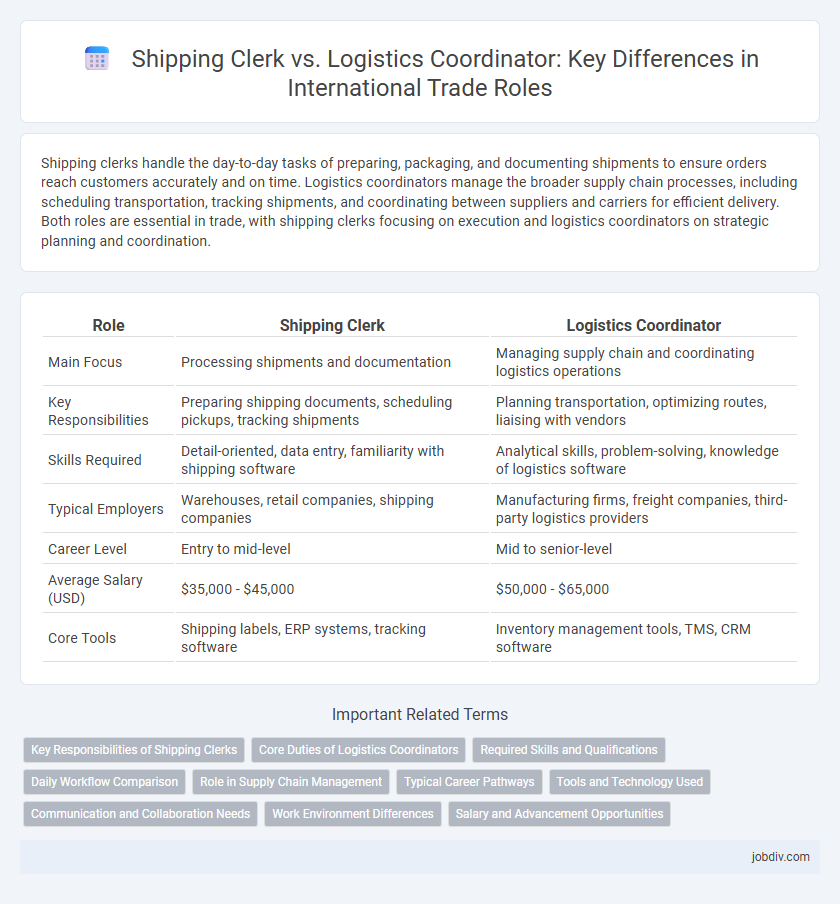Shipping clerks handle the day-to-day tasks of preparing, packaging, and documenting shipments to ensure orders reach customers accurately and on time. Logistics coordinators manage the broader supply chain processes, including scheduling transportation, tracking shipments, and coordinating between suppliers and carriers for efficient delivery. Both roles are essential in trade, with shipping clerks focusing on execution and logistics coordinators on strategic planning and coordination.
Table of Comparison
| Role | Shipping Clerk | Logistics Coordinator |
|---|---|---|
| Main Focus | Processing shipments and documentation | Managing supply chain and coordinating logistics operations |
| Key Responsibilities | Preparing shipping documents, scheduling pickups, tracking shipments | Planning transportation, optimizing routes, liaising with vendors |
| Skills Required | Detail-oriented, data entry, familiarity with shipping software | Analytical skills, problem-solving, knowledge of logistics software |
| Typical Employers | Warehouses, retail companies, shipping companies | Manufacturing firms, freight companies, third-party logistics providers |
| Career Level | Entry to mid-level | Mid to senior-level |
| Average Salary (USD) | $35,000 - $45,000 | $50,000 - $65,000 |
| Core Tools | Shipping labels, ERP systems, tracking software | Inventory management tools, TMS, CRM software |
Key Responsibilities of Shipping Clerks
Shipping clerks manage inventory documentation, prepare shipping orders, and coordinate the timely dispatch of goods to ensure accurate order fulfillment. They inspect packages for damages and verify shipment contents against invoices to maintain quality control. Their key responsibilities also include maintaining shipping records and liaising with carriers to track shipments and resolve delivery issues.
Core Duties of Logistics Coordinators
Logistics Coordinators manage the entire supply chain process by scheduling shipments, tracking inventory, and coordinating with carriers to ensure timely delivery. They analyze shipment data, optimize routes, and handle documentation for compliance with trade regulations. Their core duties include maintaining communication between suppliers, warehouses, and customers to streamline logistics operations and reduce costs.
Required Skills and Qualifications
Shipping Clerks require proficiency in inventory management software, attention to detail, and knowledge of shipping regulations to accurately process orders and track shipments. Logistics Coordinators must possess strong organizational skills, expertise in supply chain management, and the ability to coordinate multiple transportation modes to optimize delivery schedules. Both roles demand effective communication skills and experience with data analysis tools to ensure efficient trade operations.
Daily Workflow Comparison
Shipping Clerks handle order processing, packaging coordination, and shipment documentation on a daily basis, ensuring accurate fulfillment and timely dispatch. Logistics Coordinators focus on route planning, carrier selection, and tracking shipments to optimize delivery schedules and reduce transportation costs. Both roles require regular communication with suppliers and carriers but differ in scope, with Shipping Clerks concentrating on execution and Logistics Coordinators overseeing strategic logistics operations.
Role in Supply Chain Management
Shipping Clerks handle the documentation, packaging, and coordination of outgoing shipments to ensure accurate and timely delivery within the supply chain. Logistics Coordinators oversee the entire flow of goods, managing transportation schedules, inventory levels, and supplier communication to optimize supply chain efficiency. Both roles are crucial for seamless operations, but Shipping Clerks focus on execution while Logistics Coordinators emphasize planning and coordination.
Typical Career Pathways
Shipping Clerks typically start in entry-level roles managing order processing and inventory, gaining experience in documentation and customer communication before advancing to supervisory positions or transitioning into logistics roles. Logistics Coordinators often have backgrounds in supply chain management or related fields, progressing through roles that emphasize transportation planning, shipment tracking, and vendor coordination to senior logistics or operations management positions. Both career pathways benefit from expertise in inventory control, regulatory compliance, and software systems like ERP and TMS, essential for advancement in trade and shipping industries.
Tools and Technology Used
Shipping clerks primarily use inventory management systems, barcode scanners, and basic shipping software to process orders and track shipments efficiently. Logistics coordinators leverage advanced transportation management systems (TMS), GPS tracking, and supply chain analytics tools to optimize routing and monitor delivery performance in real-time. Both roles rely heavily on integrated enterprise resource planning (ERP) platforms to synchronize data across procurement, warehousing, and distribution functions.
Communication and Collaboration Needs
Shipping Clerks primarily handle order processing and shipment documentation, requiring clear communication with warehouse staff and carriers to ensure timely dispatch. Logistics Coordinators oversee broader supply chain activities, demanding intensive collaboration with suppliers, transporters, and internal teams to optimize routes and manage inventory. Effective communication skills in both roles are crucial for coordinating schedules, resolving discrepancies, and maintaining seamless freight operations.
Work Environment Differences
Shipping clerks typically work in warehouse or distribution center settings, handling inventory documentation and preparing shipments in physically demanding environments with frequent manual tasks. Logistics coordinators often operate in office environments, utilizing software systems to plan, track, and optimize supply chain operations, requiring strong communication and analytical skills. The shift from hands-on, operational roles to strategic logistics management highlights distinct work environment differences between these positions.
Salary and Advancement Opportunities
Shipping Clerks typically earn an average salary ranging from $30,000 to $40,000 annually, with entry-level positions offering limited advancement potential. Logistics Coordinators command higher salaries, often between $45,000 and $60,000 per year, due to greater responsibilities in managing supply chain operations and vendor relationships. Career growth for Logistics Coordinators includes pathways to logistics management and operations director roles, offering significantly enhanced salary prospects and leadership opportunities.
Shipping Clerk vs Logistics Coordinator Infographic

 jobdiv.com
jobdiv.com